African buffaloes are easily identified because they look close to domesticated cattle, and yet have distinct horns that join to cover up the forehead.
African buffaloes are among the most widely spread animals that many people see in the national parks and game reserves when on Safari. Because they look like domestic cattle, it is easy to misunderstand the buffaloes.
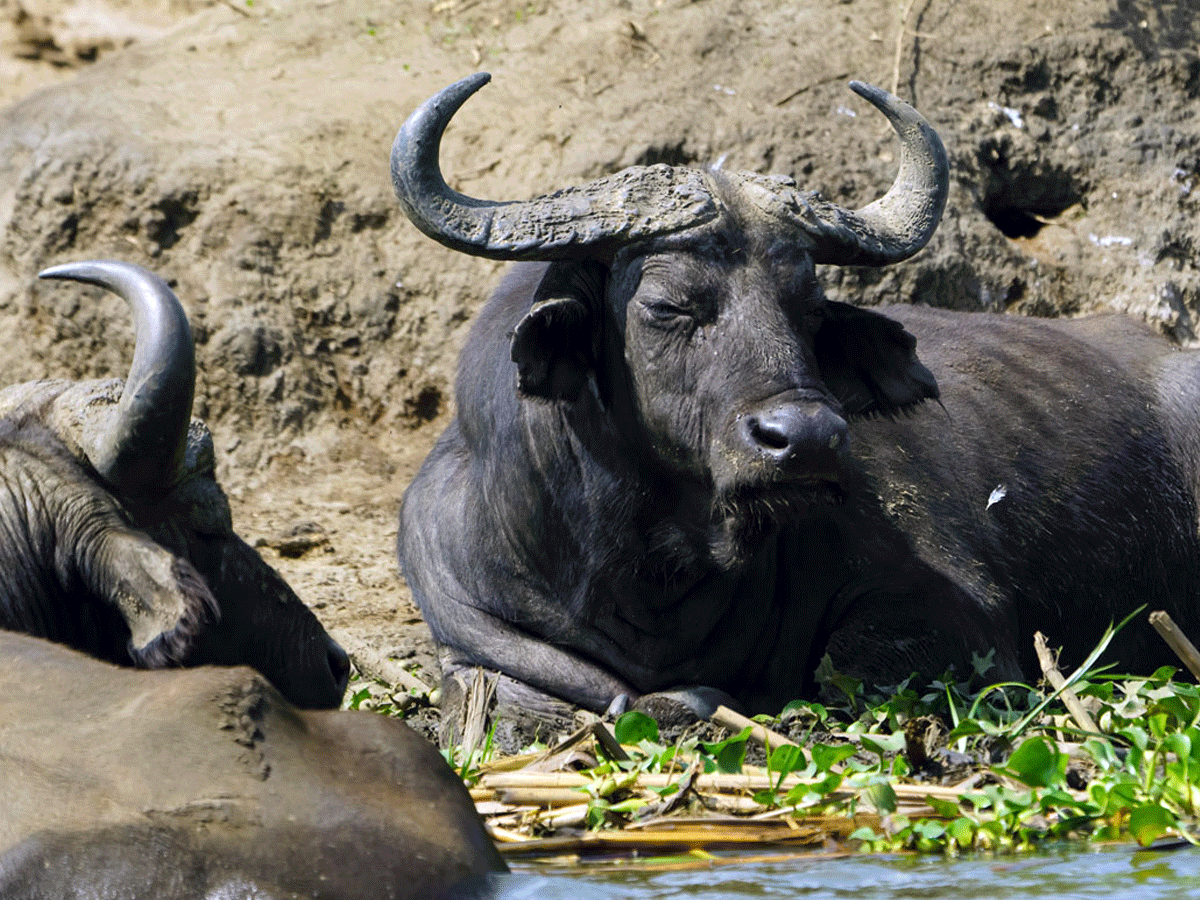
The truth is that these African buffaloes are very wild, and as dangerous as hippos or crocodiles when it comes to the danger they pose to humans - and wild animals.
In this article, we'll go through the things that make African buffaloes very interesting. From their strange horns to their aggressive nature and 'voting' social structure, African buffaloes are fascinating.
Facts About African Buffalos
1. African Buffalos Habitat
As the name suggests, African buffaloes live on the African continent in the grasslands and forests of many countries below the Sahara desert. Buffaloes prefer environments that have plenty of grass for grazing as well as drinking water.
The cape buffalo is found in most of Eastern and Southern Africa while the forest buffalo is common in the forested areas of Central and Western Africa.
2. Number Of Buffaloes In A Herd
African cape buffaloes are very social and live in herds of various sizes. Large herds can comprise more than 1,000 buffaloes that belong to sub-herds and respect the social structure of the entire herd.
The herd of African buffaloes can also be called a "gang". It's probably the most gangster name of all African animals.
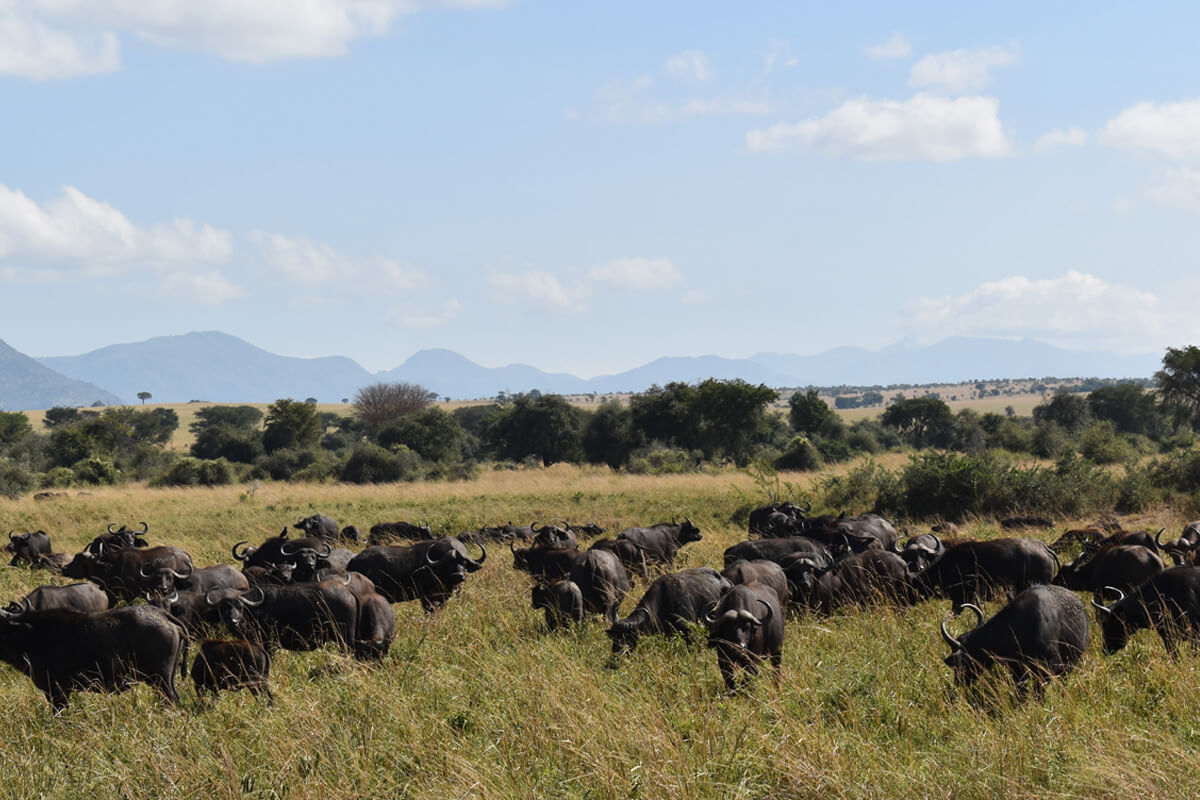
3. Are African Buffalos Dangerous?
African buffaloes are very dangerous because of their highly unpredictable behaviour. They are part of the Big Five animals for a reason, and they are well known for charging at poachers or hunters with the purpose of killing.
African buffaloes are thought to be as dangerous as the hippopotamus and they kill a comparable number of humans each year.
Related article: Why are hippos dangerous
4. Do Buffalos Kill Lions?
Cape buffaloes have been known to fight, kill or chase lions on occasion. Buffaloes engage in mobbing behaviour when fighting off a predator and sometimes this results in a dead lion.
Because of the large buffalo herd size, lions can sometimes die from being trampled by a group of buffaloes.
Lions will often not prey on adult cape buffaloes because there is easier prey. Angry buffaloes have been observed chasing lions until the lions climb trees to hide from the African buffaloes.
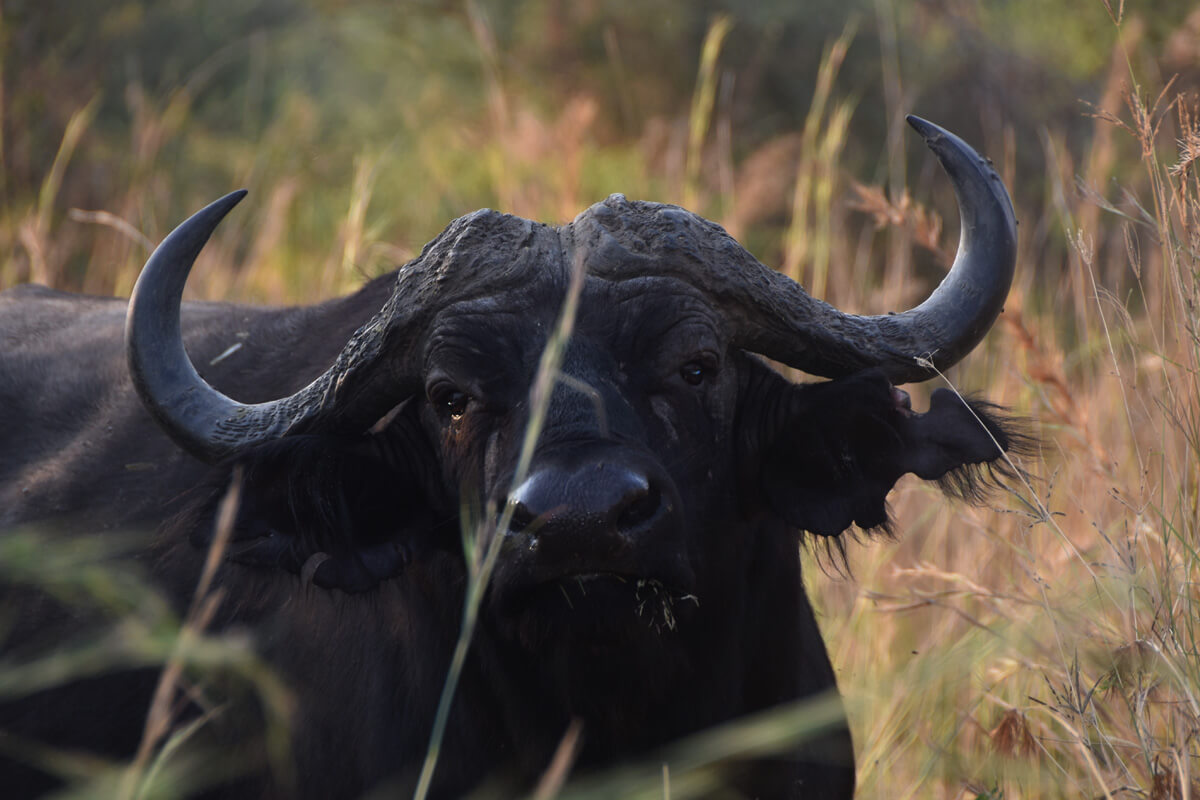
5. What Buffalos Eat
The African cape buffalo is a herbivore that eats grasses and shrubs. Buffaloes prefer grass to shrubs and are often referred to as nature's lawnmowers because they can quickly thin out dense grasses.
6. African Buffalo Weight
African Buffaloes are big and heavy animals that can weigh up to 1000 kg (2200 lb). The Cape buffalo subspecies (which is the most common) are the biggest and heaviest while the forest buffalo is approximately half in size and weight.
Related articles: Heaviest African animals to see on safari
7. How To Tell Male & Female Buffaloes Apart
The easiest way for you to tell buffaloes apart is by their size and horns. Male buffaloes are bigger than females in size and have horns.
In males, the base of the horns grows closer together to finally form a shield, commonly referred to as a "boss". The females do not have the "boss" and their horns are smaller in size (around 15%).
8. Are African Buffaloes Smart?
African buffaloes exhibit some intelligent behaviour, such as having a clear social structure, staying in a range close to the water, and being vengeful. An attacked buffalo will go after the attacker (human or animal) with everything it has.
Many hunters have lost their lives because their first shot didn't kill the buffalo and it charged at them with resolve.
9. How Do African Buffaloes Communicate?
Buffaloes use several vocalizations to communicate with each other. They emit low-pitched calls that are similar to those made by domestic cattle.
As they graze, African buffaloes also make sounds such as brief bellows, grunts, and honks.
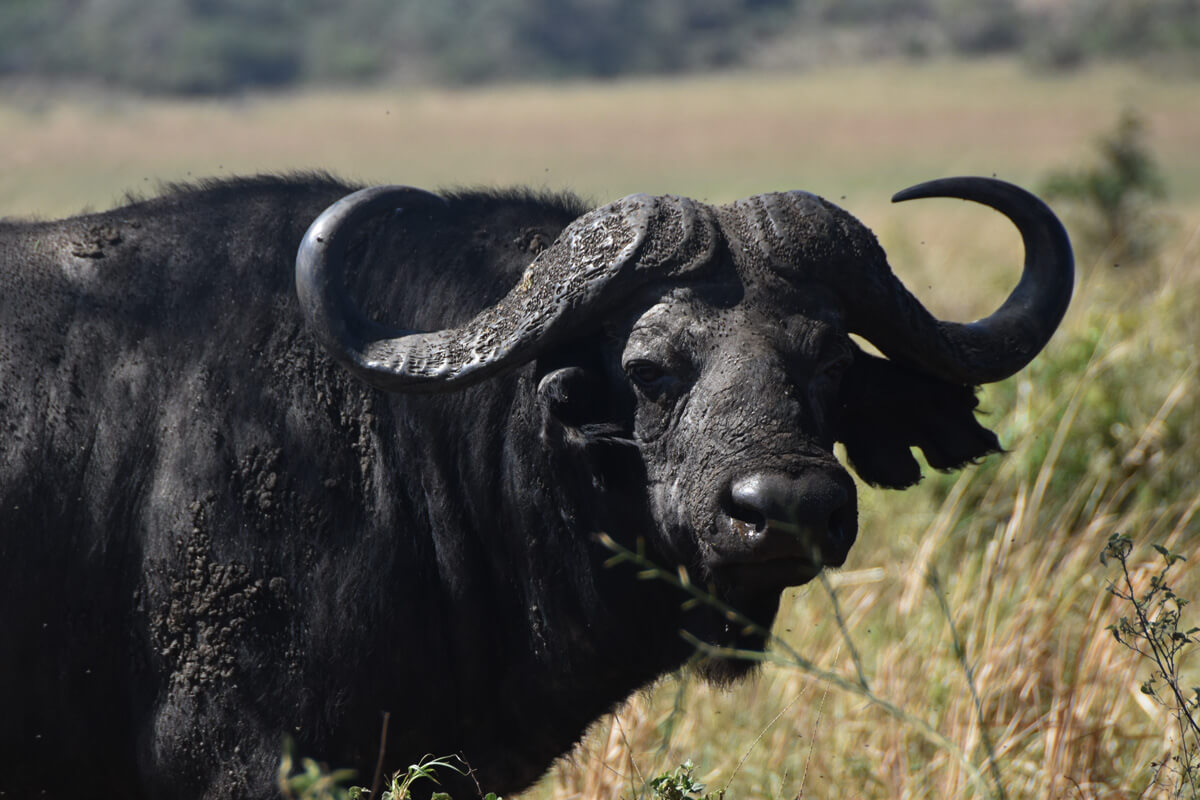
10. Are African Buffalos Related To Cattle?
African buffaloes are not related to domestic cattle. They are related to the water buffalo from Asia. Due to the unpredictable temper, it is believed that African buffaloes have never been domesticated.
11. Can African Buffalos Be Domesticated?
Because of their unpredictable temper, African buffaloes have never been domesticated. Their Asian counterpart, the water buffalo has been tamed and domesticated, but not the African buffalo.
12. Lifespan Of African Buffaloes
In the wild, African buffaloes live for around 20 years while they can live up to 30 years. The oldest recorded Cape buffalo lived for 32 years.
In the wild, buffaloes have to deal with diseases, predators, and other environmental factors.
Related article: Lifespan of African wild animals.
13. How African Buffaloes Reproduce
African buffaloes give birth every 2 to 3 years after a gestation period of 11.5 months. The newborn calf is kept hidden in vegetation for a few weeks while the mother is nursing it before it can join the herd.
Cape buffaloes only give birth in the rainy season. The start of the rainy season is the peak period for giving birth while the end of the wet season is the peak time for mating.
14. Why Buffaloes Always Have Birds
African buffaloes have a very symbiotic relationship that benefits both the buffalo and the birds. The birds feed on the ticks and parasites that are on the buffalo, which is good for the buffalo because these parasites suck a lot of blood and can weaken the animal.
This is why buffaloes are happy to keep the company of birds, and birds are equally happy to help.
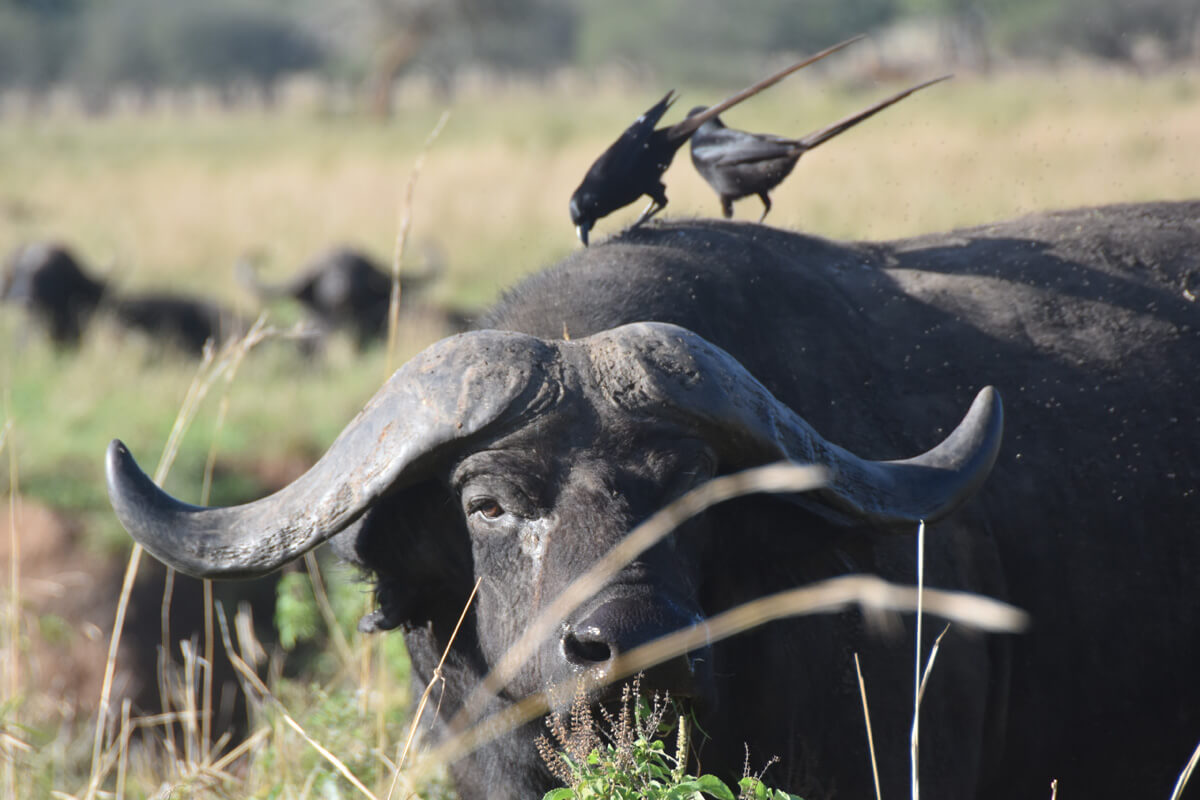
15. Do African Buffaloes Get Sick?
African buffaloes do get many diseases such as foot and mouth disease and corridor disease (East Coast fever). These diseases can remain dormant within the herds as long as the buffaloes are healthy.
Whenever a sickness outbreak is detected, the park authorities try to separate the disease-free herds from the infected herds. This is why moving wild animals from one place to another is a lengthy process.
16. Are Cape Buffaloes In Danger?
Of all the animals in Africa's wilderness, the Cape buffalo is among those not in any immediate danger. The numbers and distribution are good in many of the national parks and game reserves.
The only dangers faced by Cape Buffalo are the same dangers faced by all animals, human activity, and climate change.
17. Threats African Buffalos Face
Buffaloes face very little threat of predators in the wild. While lions do kill them for food, it takes an entire pride to kill one buffalo and usually, the whole herd of buffaloes can protect itself (and even hurt the lions)
Besides, the struggle of the jungle, African buffaloes face the problem of a shrinking habitat due to human activity. Human activity and the effects of climate change are a big challenge to all animals and their ecosystems, and buffaloes are not exempt.
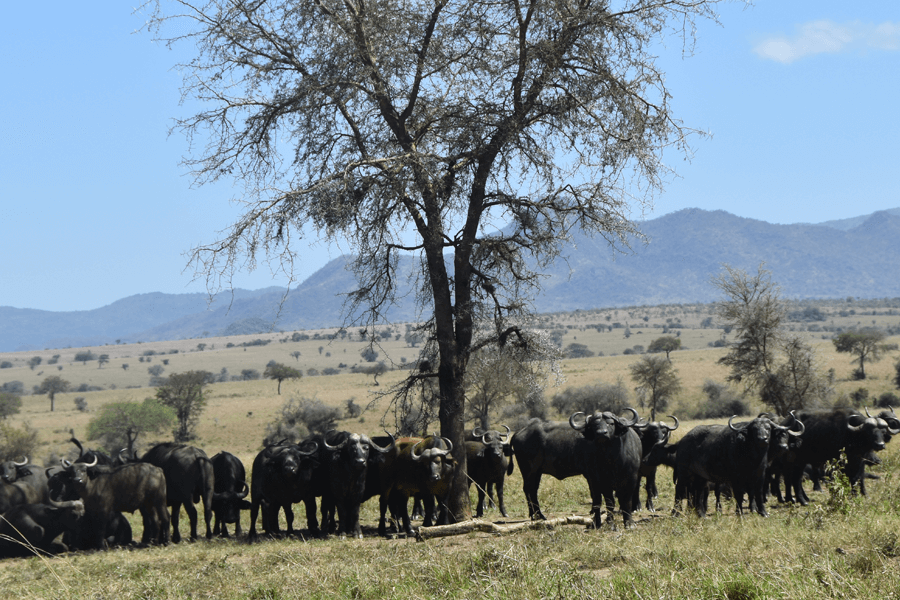
18. Buffaloes Are Left In The Wild?
According to the African Wildlife Foundation, there are about 900,000 cape buffaloes left in the wild. This is inclusive of all 5 subspecies. It is estimated that around 10,000 new buffaloes are born each year and therefore their population is stable and not at immediate risk.
Final Thoughts
Hopefully, you now understand why African buffaloes are part of the big 5, and why you must be careful around them. They are a very volatile and vengeful gang.
If you get to take an African Safari that has buffaloes, hopefully, you will remember all these fascinating facts and be grateful for the scientists who have dedicated their time to studying these awesome and altruistic animals.
